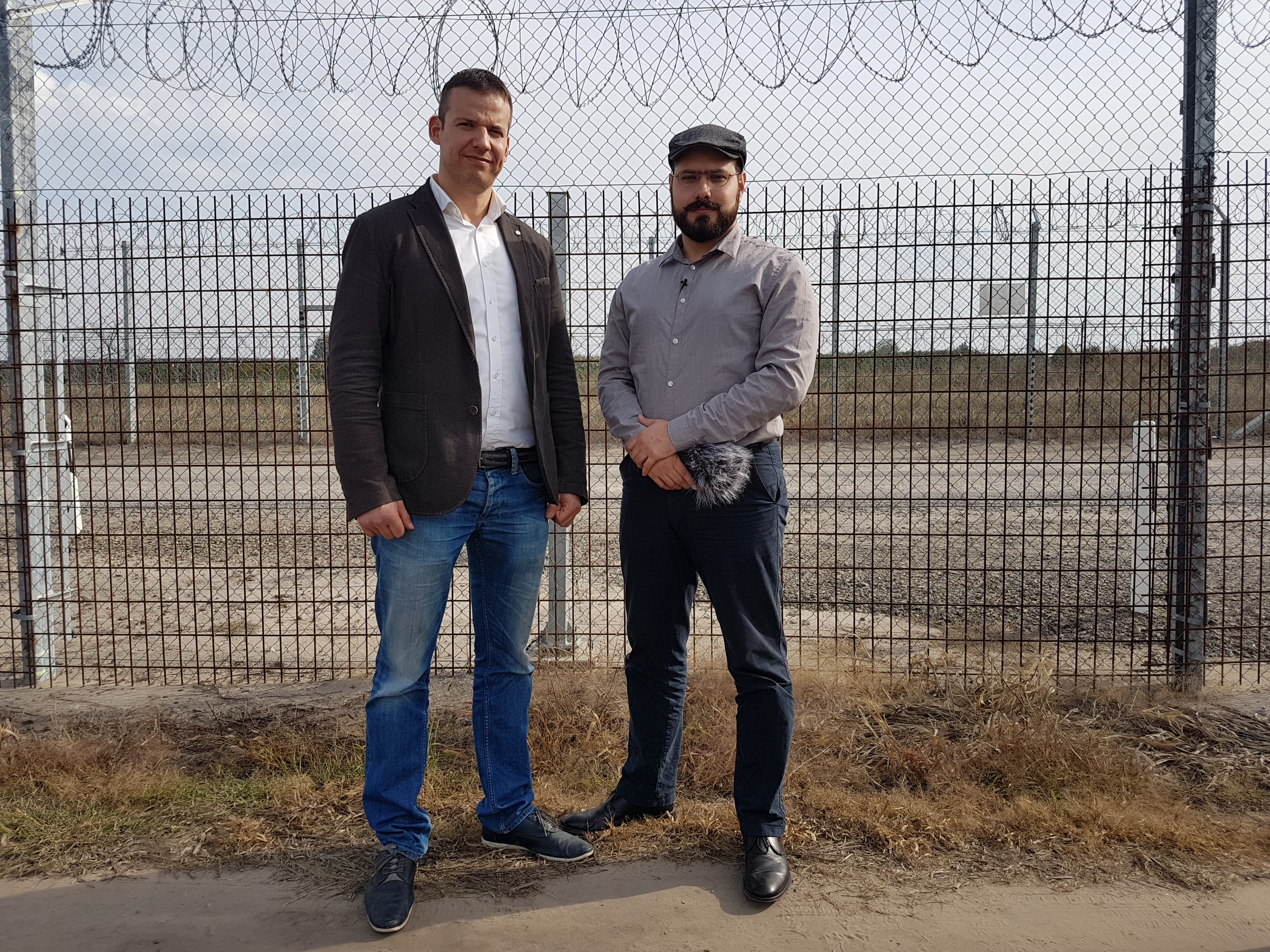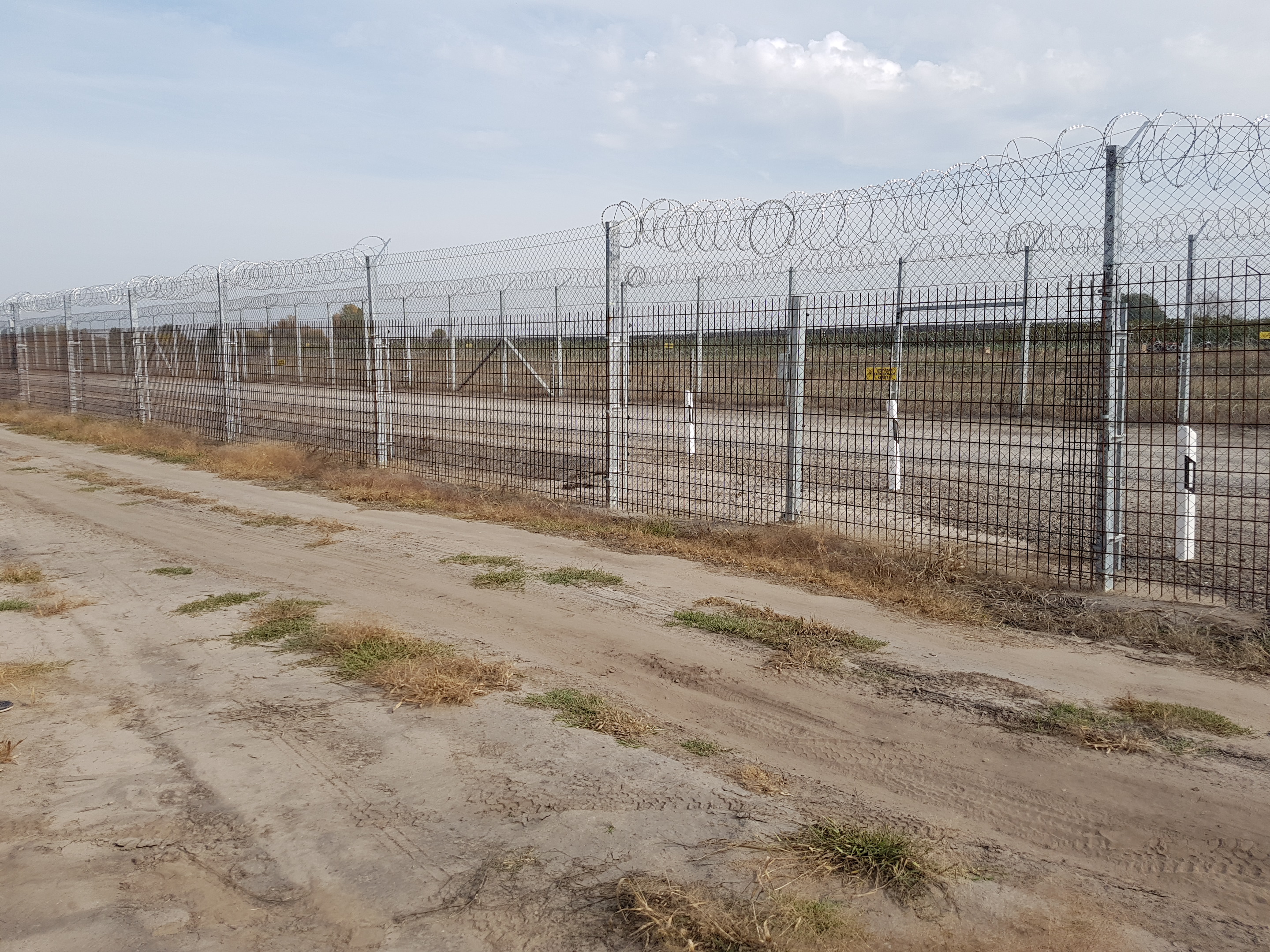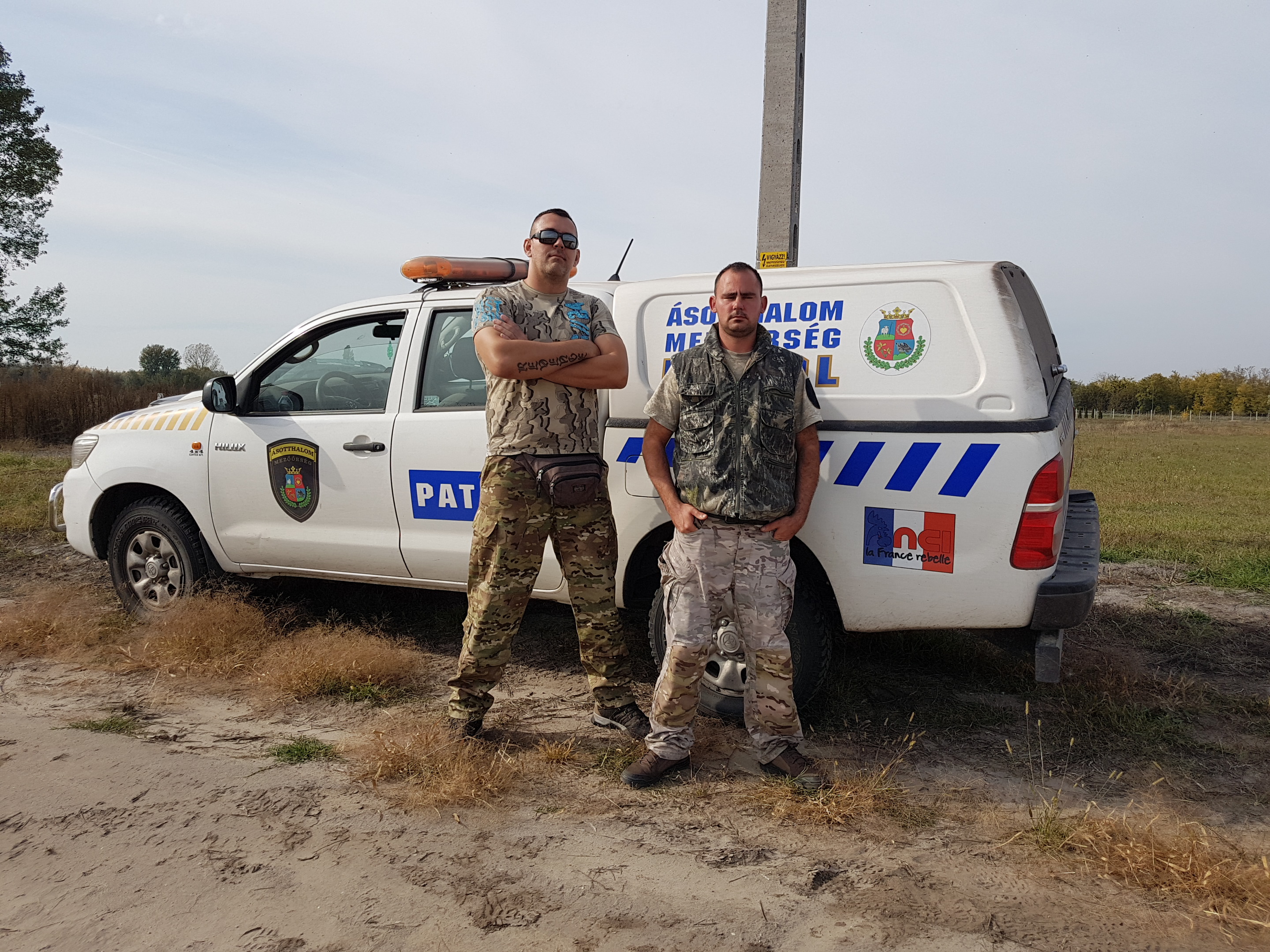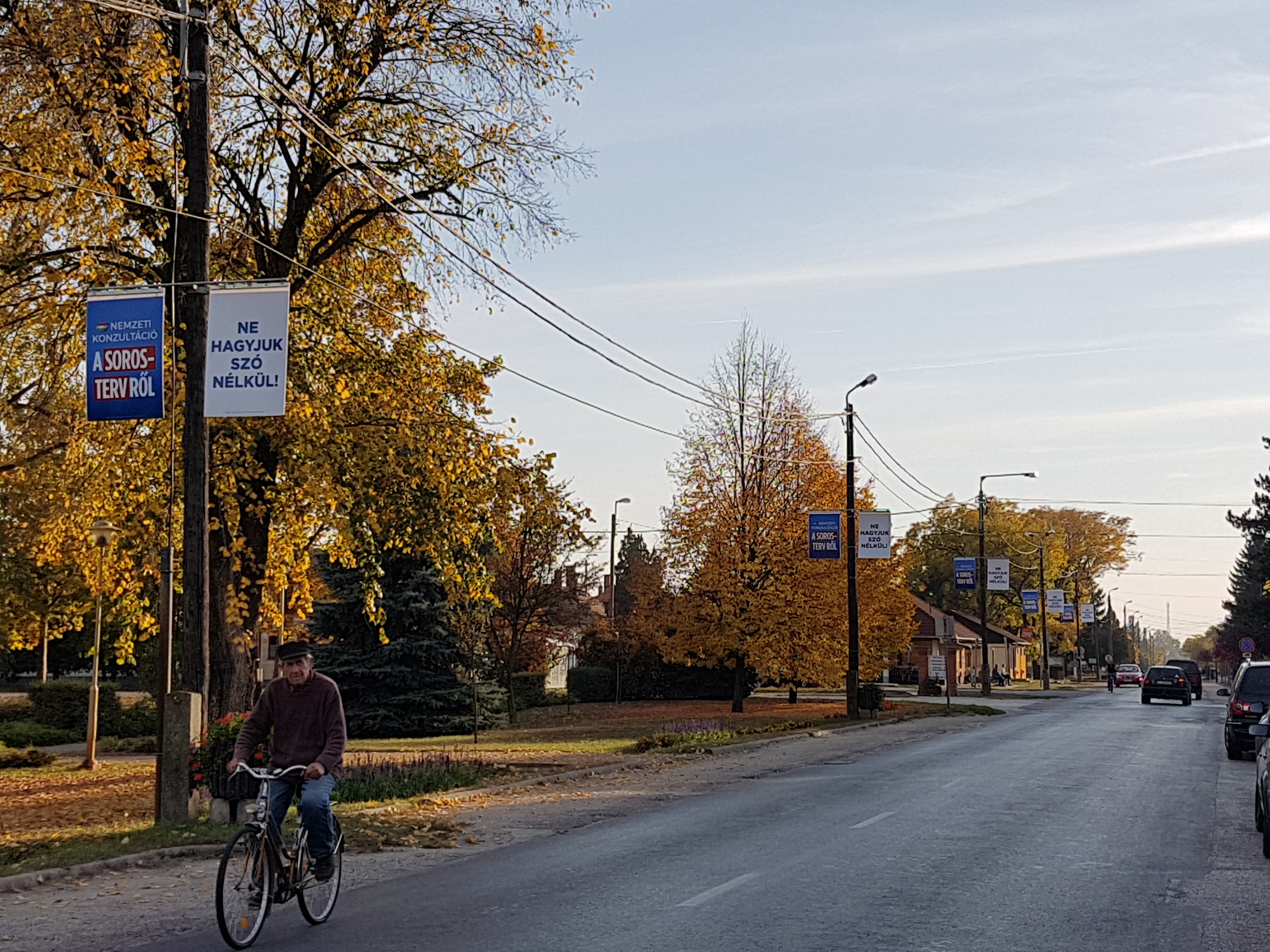Hungary, Ásotthalom – László Toroczkai, Hungarian mayor of the Ásotthalom municipality on the border with Serbia and Vice President of Jobbik: “If the Four of Visegrád manage to stay strong and united, then there is hope that the European Union will survive”
Ferenc Almássy met the famous mayor on the border between Hungary and Serbia, where Mr Toroczkai got the idea of the barrier. Interview conducted mid-October 2017.

Ferenc Almássy: Can you summarize the migratory past and present situation in your municipality? You made a global buzz in 2015 by posting a video aimed at migrants. What has been, and is your role now in all this?
László Toroczkai: We saw here in Ásotthalom the first illegal migrants in 2012, but it is late 2013, early 2014 that they began to flow in large groups. And this is not a coincidence, because Hungary had to change its immigration policy at the same time: the European Union then asked to llow them to enter freely, without any control. It was impossible to detain them, or to close the border – this border being that of Schengen too. In my opinion, the European Union then sided with illegal immigrants and illegality; because crossing a border illegally is a serious offense.
Interestingly, from 2015, all illegal activity has practically stopped in the region, on both the Hungarian and Serbian sides. All the trafficking groups and criminal organizations were therefore concentrated on immigration: specifically the smuggling of migrants, the illegal crossing of the border. It is a more profitable business for them than burglaries, theft, prostitution or drug trafficking. It is obvious that the EU has supported these criminal organizations by introducing such liberal measures, which we have tried to fight as we could. It is important to note that from the point of view of my political stance on this issue, I naturally received no help when I became mayor in December 2013.
I immediately asked for help in order to do border surveillance, without success, and even today the European Union is not helping us. In the beginning, the Hungarian government did not help us neither, and that’s why I established the rural guard of the town, which is the only possibility for a mayor to have under his command legally armed people. At first we had three members, then five. The running costs and salaries are covered by the municipality, which is a significant burden for Ásotthalom and its 4,000 inhabitants.
In 2014, police officials invited to our local forum still gave us no reassuring news. Same thing for the local elected officials of the county of Csongrád (the counties are the administrative regions of Hungary, ed), and that same year 2014, I then asked the government to consider the erection of a barrier along the Hungarian-Serb border, and my request was rejected, several times: each time, I was told that Brussels would not allow it, given the EU’s immigration requirements. So we tried with my 3 to 5 guards to stop the hundreds of migrants arriving daily on our territory.
At that time, the illegals were mainly Kosovars, and there is no way one could speak about refugees when it comes to Kosovo, no war was raging over there, and they did not even hide it when we were talking to them. They openly explained to be economic migrants aiming to go to Germany.
FA: Can they be considered to have paved the way for the Balkan route?
László Toroczkai: Obviously. They literally trampled a new path for future immigration. I had then called the ambassador of Kosovo to Budapest, as a mayor, and asked him for the Kosovo authorities to do something in order to stop this Kosovar migration. His answer was simple: it’s not up to them to do it, but to the Hungarian police. I replied that they should inform and discourage their fellow citizens on the departure. All this was organized, and of course the Serbian state had no reason to oppose it, on the contrary, thousands of Albanians were leaving Kosovo …
By the way, when I was speaking with Kosovar migrants, I have heard similar stories many times: Serbs often bought homes from those who did not intend to return. So it can be said, Serbia was and until noy is not stopping this migration. The climax was reached when photos came out showing Serb policemen accompanying migrants to our border.
FA: Maybe Serbia, wanting to join the EU, is zealous or at least does not want to oppose the will of the EU?
László Toroczkai: It’s obvious, Serbia is trying to integrate the EU, and therefore does not want to oppose Brussels, and Angela Merkel is very important to Serbia, Germany being for Serbia also a major economic partner, and Ms. Merkel clearly articulated her vision and invited the migrants …
FA: But this argument against Germany is also true for Hungary, yet from a given time Hungary opposed Merkel’s policy.
László Toroczkai: Because Hungary is already a member of the European Union. It’s a very big difference. It is true that the German economy is very important for the Hungarian economy, but to my great pleasure, the Hungarian government renounced in 2015 its passive attitude, and the summer of 2015 the construction of the barrier was announced. It was the best day of my life.
Many people then asked me if I was not frustrated that my idea of a barrier was taken over by the government on its own. In fact, while I had to face the passivity of the authorities, I started to share on my Facebook account the photos, videos and testimonies of what was happening here at the border. Hundreds of thousands of people have seen the avalanche of evidence which has caused a shock on a national level. Nobody knew anything about it in Hungary at the time, because the media did not care about the situation at the border.
But via the internet and my publications, public opinion has begun to seize the topic, and I sincerely believe that this is what pushed the government to act, because thank God the majority of people in Hungary do not want to migration, and want to protect their homeland, and thus support the barrier.
This popular pressure has therefore I think forced the government to act and even if I am the vice president of the main opposition party (I became such a little after the announcement of the construction of the barrier) I am not upset at all that the government has “stolen the show” and I thank even our government. I thanked it then, I thank it now and I will do it again.
This is about the interest of the nation, the interest of Europe, and it is of absolutely no importance that the barrier be attached to the name of László Toroczkai or Viktor Orbán. I did my duty, informing, protecting the border locally, but I am very grateful to the government. It took a lot of courage for the Hungarian government to deal with a very important international opposition. It is unbelievable to see the number of attacks we have received for building this barrier and protecting our border. The attacks were very violent on the part of Austria for example, but today we have come to see a radical change in Austria, and the Austrian Minister of Defense has even come to visit me, with his Hungarian counterpart. So thank God, we see very significant changes taking place on these topics.
FA: Changes that led Austria to choose Kurz as Chancellor, who boasts of having ended the Balkan route.
László Toroczkai: Absolutely. Two-thirds of Austrians voted for border protection and against illegal immigration. I had announced such a shift in 2014 already to many journalists, and they see me as a prophet today, when it was obvious. Whoever knows what I am talking about, who knows the reality, knows that there is only two options. A first possibility is that the parties in power in Europe do change their strategies, their policies, this is what we saw in Hungary, as Fidesz changed in 2015 its migration policy, and today it is precisely in Austria that one can witness such a change. The other possibility is that if these dominant parties do not change, then the people will simply replace them with others, and new political forces will come to power.
We saw the AfD in Germany reaching the third place, as well as Merkel losing a lot of votes. We can see everywhere in Europe that these forces are gaining ground, as we have seen it also in France. Of course, this momentum is sometimes broken, because of splits, and amateurism… the AfD precisely showed that they did not know how to exploit the opportunity which was given to them. And so it’s an opportunity for the oldest parties, mainly center-right ones, much more professional and better organized, to pick up these votes.
But if we look at what is good for my municipality, what is good for my country, for the European civilization, and even for the EU, it is irrelevant to know who is ruling, as long as this anti-migration policy enters into force. And now we see that no one can change this policy at our border, and therefore no one will be able to demolish this barrier.

FA: What is to be expected now regarding the migration issue? Is the current situation satisfactory to you? Viktor Orbán said, for example, that according to NATO estimates, about 60 million Africans are about to come to Europe. What should you prepare for? What are you preparing for, here?
László Toroczkai: Three years ago I was saying the same thing as now, and I’m sure I’m absolutely right on this point: migration seems impossible to stop, migrants will continue to flock, migrate to Europe. And that will concern this place too. But we control the situation. It is possible to pass the barrier, it still happens time to time, but what matters is that when it happens, we know it, the police know it live. For example, there is an electrified fence behind me – which of course has led to a lot of criticisms. Well, this fence is intended to detect passages, and it is less painful to the touch than an ordinary electric peasant fence. And in addition to this system, there is also a video surveillance system along the 175 km of this stretch of border, set up by the Chinese, which allows to monitor the border night and day.
FA: But other methods are being developed. I heard about a tunnel …
László Toroczkai: I do not have concrete information on this, I think it’s only a rumor. But a tunnel is not necessary anyway, because what they do in general is to approach the barrier in large groups; they then attack at a point at the barrier, use ladders, pliers to cut the fence. And of course at this moment the police and the army are concentrating their forces there. This group folds then back to the Serbian side and another group quickly passes a few kilometers away, taking advantage of the absence of troops. It is then that the “hunting” begins, so to speak, especially on the 122km² of my municipality of Ásotthalom, of which 61% are covered with forest, which makes the task difficult.
This is where my rangers play a vital role. At five, they manage to intercept as many migrants as a hundred national policemen, according to our statistics.
FA: How is this possible!
László Toroczkai: On the one hand, because my guards have perfect knowledge of the town’s territory, they were born here, they live on farms here, and on the other because the communal territory is covered with farms and firstly the locals alert our guards when they spot migrants. If they’d called the police, it would go through a standard, it would need GPS coordinates … but by speaking directly to the guards, the information passes right away.
The motivation of the guards is also different from that of the police. In doing this work, the country guards also protect their own property, their own living place. This is not the case for the police officer sent here from the other side of the country. But so we can help the police a lot, and we have mixed patrols for that reason.

FA: You are one of the vice presidents of Jobbik, the Hungarian populist party, the main opposition party, and even if this post does not exist, you are considered as the second man of the party. However, in this election campaign in Hungary for the elections of Spring 2018, which is particularly violent, we do not hear much from you. You seem withdrawn, quite passive. There is a particular reason for that, maybe strategic considerations?
László Toroczkai: There are two other mayors in the ruling college, besides me, and each of us seems quite silent in this campaign because as mayors we work for our communes for twenty hours a day, so we can not participate so intensely in this campaign. But for example on the project of Union of wages launched by Jobbik, which I consider to be a very important element, I am quite active, at the end of October I will be in Fiume and in Osijek in Croatia to gather signatures and thus to take part also in the electoral campaign.
FA: Let’s go back to your mayoral activity. Your municipality is sparsely populated and has long been poor, things have improved dramatically and everything is changing in Ásotthalom. The roads are renovated, the municipal sites develop, you have even launched a major trans-regional bicycle route project. What is your secret?
László Toroczkai: The first reason is that I do not steal communal money. It’s already something very important. And as a regional councilor, I am working hard to ensure that my municipality and the entire border area benefit from aids and investments, and therefore I am pleased to see the fruits of our work, including the arrival of numerous European grants. These are often projects developed over a period of three years, and a number will be realized next year. At the moment, a cycle road of several hundred kilometers, straddling Hungary and Serbia, is being built. I also think that my ability to attract attention and stimulate interest is more important than that of a number of mayors of municipalities of this size.
I also note that at the regional level, there is a real desire to work for the regional interest, and that all know how to go beyond party logic for the common good, so we have worked on development strategies together. It was, for example, a common goal to defend the border, and the mayors of the border were also decorated for their work. Since there is such a capacity for collaboration, why should I oppose others? I prefer constructive opposition: I sometimes propose projects and then we work together for the region.

FA: Talking about projects, you want to erect a statue of Saint John of Capistrano in your municipality. A video calling for donations is available on the internet. What can you tell us about that?
László Toroczkai: I could say it’s an old dream. I would like to install a statue with great symbolic value near the border crossing point of the town. The statue will commemorate the Christian victory in Belgrade in 1456, when Hungarian forces, assisted by Serbs, but also Hungarian crusader peasants of Saint John of Capistrano, stopped the Ottoman troops in significant surplus, thus saving not only the Kingdom from Hungary, but also Europe. This is why the bells still ring everywhere at noon, to celebrate this major victory.
This statue will be a message. On the one hand, it will symbolize Saint John of Capistrano holding a cross, on a wall, with a Hungarian soldier coming to him with a broken Ottoman Islamic flag, and a Turkish head will be piled on a peak next to it. It is inspired by a classical medieval representation, the Turk’s head stuck on a sword, which is found on the coat of arms of the Christian fighters who gained their titles of nobility in the fight against the Turks.
This will send two messages to Europe. First, that we can also stop migration today, we have already done it here, order and peace reign again. Secondly, regardless of our personal qualities and flaws as Christians, our European civilization is based on Christian foundations. It also defines the life of non-Christian Europeans, for example, a man marries a woman, we celebrate Christmas, and so on, and this, regardless of the faith of each, determines our lives and our relationship to the world. And this statue passes the message that we do not want political Islamization, neither extremist liberalism in Europe. We want a Europe built on European traditions, and a normal world.
FA: Many liberals consider this statue to be a violent, aggressive message …
László Toroczkai: That’s the reality! It would be nice to be able to represent the defenders of the last bastion and Saint John of Capistrano as grandmothers doing sewing, but that would be a lie and a distortion of history. These men defended Europe with swords.
FA: To conclude, what do you think of the Visegrád group?
László Toroczkai: I consider that the cooperation of the Visegrád Group is extremely important, and within this especially the good Polish-Hungarian relationship. I will participate myself this year in the march of independence in Poland on November 11, I will even give a speech there, as well as in the Polish parliament. I consider it crucial to strengthen the Hungarian-Polish bond, simply because the two countries are the ones with the most healthy positions towards mass immigration and the preservation of national identities and cultures.
If the Four of Visegrád manage to stay strong and united, then there is hope that the European Union will survive, but if the latter continues to follow Brussels policy, then it is the end of the EU. Look at where we got: as Brussels policy criticizes our barrier and wants to keep external borders opened, some countries in the EU are closing their borders between each other. Today there is for example a border control between Austria and Hungary, Germany but also Italy. This is not normal, we are destroying the European Union. The main advantage of the Union was our freedom of movement. If they break that, it is the foreseeable end of the EU.
Our last hope for Europe is therefore the Visegrád Group. The question arises only whether Brussels or Emmanuel Macron will do everything to break the Visegrád group, but I believe rather in the strengthening of the V4. Today we see in Austria what political changes are taking place, and I do not consider it excluded that Austria will be getting closer to our alliance, but we could also talk about Croatia and Slovenia, which could even become members, or even the Baltic States, so I think we are at the beginning of a very serious cooperation in Central Europe.



